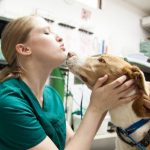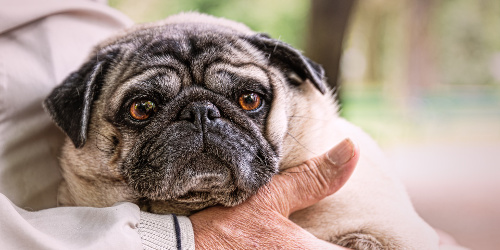This article was updated on May 27th, 2021
Are you worried that Fido is suffering from older dog health problems?
If he’s a large or giant breed and is seven or older, or a small breed who’s over 10, then yes, he could well be having some senior dog issues.
But there’s no need to panic.
It can be really hard to accept that our best friend is aging, and it’s easy to over-think things or worry too much. Aging is, after all, a natural process.
Some changes are just the normal side-effect of passing years, BUT others might need lifestyle or dietary changes, or even veterinary help.
So let’s see if I can help you figure out what’s going on with your dog AND what you can do to help.
Scroll down or use these links to jump straight to the section you’re especially interested in…..
Common Health Problems In Older Dogs
Elderly dogs have the same sorts of issues that elderly people do.
Joint and mobility problems, chronic conditions, heart disease, diabetes, incontinence, cognitive decline, vision or hearing loss and so on.
Some are just a nuisance, others can be much more serious.
Here are some of the most common older dog health problems:
Mobility Problems
Is Fido moving more like a snail than a dog? Does he take a-g-e-s to get up onto all four legs first thing in the morning, or after a nap?
Are climbing the stairs, or hopping into the car now outside his comfort zone? If so, he’s in good company!
Most dogs slow down as they get older.
General stiffness, lameness and/or joint pain is common and it can be caused by canine arthritis, hip or elbow dysplasia, carrying too much weight, muscle loss, vertebrae/disc disease and more.
If symptoms come on suddenly or are severe enough to impact his quality of life, then a trip to the veterinarian asap is in order.
Mobility issues that creep up on you (and him) are most likely not serious, and are simply a sign of old-age. BUT you still need to have Fido examined by your vet to rule out any underlying disease or major problem.
There are medications to treat arthritis or joint pain, as well as supplements which can really help.
Back problems (vertebrae/disc disease) sometimes need surgery to make sure they don’t get to the point where your dog loses the use of his legs.
For generalized senior stiffness there are a ton of products that can help make life run more smoothly, and comfortably…. memory foam beds, heated pads, ramps, elevated feeders, supplements and pain medications are just a few of them.
Under your vet’s supervision and recommendation, gentle daily exercise can be helpful and there are alternative/additional treatments such as acupuncture, massage and homeopathic remedies too.
There’s rarely any reason for Fido to be housebound, and with vet advice and a little bit of creativity and trial-and-error, he should be able to join in many family moments and activities… even if he is still a little slower than he used to be 🙂
Stumbling, dizziness and falling down…..
A different variation on the mobility theme. Sudden loss of co-ordination, stumbling or falling (especially if combined with rapid and erratic eye-movements and a head-tilt) can signal a fairly common condition called Old Dog Vestibular Disease .
This looks worse than it is, but if Fido shows these symptoms he needs to be seen by a veterinarian right away to make sure that it IS a vestibular problem, rather than a stroke, brain injury and similar.
Bladder & Bowel Problems
Losing control, or having less control, over their bladder and bowels is fairly common in older dogs, especially females (although males are not immune to this issue either). Read our related articles: why is my old dog peeing in the house or why is my old dog pooping in the house?
It’s not always easy to find out why your senior dog is experiencing incontinence, but there are a several possible causes.
Here are the ‘usual culprits’ behind urinary incontinence:
- A urinary tract infection
- Spay-related incontinence
- Kidney problems
- Cushing’s Disease
- Diabetes
- Cognitive Decline (Old Dog Syndrome)
- Seizures
- Back, spinal or neurological problems
The simplest of these to deal with a urinary tract infection, because a visit to the vet and the right antibiotics usually does the trick.
All of the others are more complicated, and might need medication or surgery, or a combination of the two.
The first step is to get your elderly dog to your veterinarian for a full check up. That way your vet can figure out what’s going on and make sure Fifi gets the right treatment.
Having leaky plumbing is no fun for your dog – and it’s definitely no fun for you either.
Luckily there are options for treatment, and dog incontinence products that can help reduce the problem, and the discomfort/mess that comes along with it.
Loss of bowel control in older dogs
If your dog is having trouble controlling her pooping as well as her peeing (this is known as fecal incontinence), then not all of the above ‘triggers’ will apply.
Here are some possibilities:
- Seizures
- Back, spinal or neurological problems (including arthritic changes)
- Cognitive Decline (Old Dog Syndrome)
- A parasitic problem, upset tummy or high anxiety levels
This is often more difficult to treat than urinary incontinence, but can be easier to handle once you know what’s causing the problem.
Dental Issues
Older dog health problems can also affect Fido’s teeth and gums.
Many old dogs have tooth decay or gum disease if they haven’t had their teeth brushed often, or been given professional cleanings.
Some of the small and tiny breeds are most at risk.
Bad, broken teeth and/or gum disease isn’t just a minor problem, it can lead to serious health issues such as heart or kidney disease.
So never just ignore stuff that’s going on in your older dog’s mouth!
Then there’s the issue of bad breath – it can be really foul if the decay is severe, or Fido’s teeth/gums are infected.
Fortunately it’s fairly straightforward to get dental problems taken care of professionally. Then it’s up to you to continue with a good at-home dental care routine.
Older Dogs & Their Weight
If Fido can’t run around and play the way he used to, or if even walks are difficult for him, it can be difficult to stop him from packing on the pounds!
BUT carrying too much weight ups his chances of getting any one of the ‘old dog conditions’ such as diabetes, heart disease, arthritis etc.
So, it makes sense to try to keep your dog as trim as possible. A healthy diet for senior dogs and age-appropriate exercise can make all the difference.
Rapid weight gain can be a sign of an underlying health issue, so if Fido suddenly seems fatter, a trip to the vet is highly recommended.
There is also the flip-side of the coin, older dogs who won’t eat or those who lose too much weight.
This can be a sign of underlying illness and if your senior dog seems to have lost his appetite, or is losing weight in spite of eating normally, he needs to be examined by your veterinarian right away.
Chronic Older Dog Health Problems
As our bodies get older, our bones, joints, major organs and brain are subject to ‘wear and tear’, this goes for dogs too.
This degenerative process can cause them to stop working efficiently, sometimes it stops them from working altogether.
Cancer is a big threat, and some breeds are genetically prone to develop certain types of cancer.
Here are some of the hurdles Fido might have to face as he gets older….
- Heart failure
- Kidney failure
- Diabetes
- Addison’s Disease
- Cushing’s Disease
- Canine Dysfunction Syndrome
- Lumps, Bumps & Growths
There are other older dog health problems that can crop up, from epilepsy to cataracts, some minor, others more serious.
Again, there’s a LOT you can do to keep Fido healthy and happy as he ages – and even major health problems can usually be managed very effectively.
Advances in veterinary medicine are being made all the time, and today our furry friends benefit from so many more treatment options than they did a few short generations ago.
Even cancer isn’t necessarily a death sentence anymore.
Both preventative care and the right treatment given in a timely fashion can help make sure that Fido and Fifi get the most out of their senior years – and we get to love on them for longer 🙂
Anesthesia in Older Dogs
It can be worrying for you if your older dog needs to be anesthetized for a procedure or surgery. Luckily there are precautions you can take, and procedures your veterinarian can follow, which make using anesthesia in senior dogs as safe as possible. Learn more about Anesthesia and Older Dogs.
Senior Dogs – Signs That All Is Not Well
Clearly it’s impossible for me to list every single sign or symptom that your dog might experience if he’s not feeling well.
There are just too many and every dog is different.
BUT, there are some things you can look out for which give a strong hint that everything is not hunky-dory inside Fido.
Here are some of the most common signs that your dog isn’t feeling well:
- Loss of appetite
- Excessive thirst
- Excessive urination
- Diarrhea
- Vomiting
- Sudden/unusual weight gain
- Sudden/unusual weight loss
- Extreme lethargy
- A lot of panting
- Pacing
- Drooling
- Lots of yawning
- Skin changes or lumps
- Constipation
- Inability to pee
- Repeated coughing
- Discharge from eyes/nose
- Bleeding from vagina or rectum
- Lameness or a limp
- Sudden personality change
- Restlessness
- Distended or hard belly
- Whimpering or whining
- Shaking or shivering
- Wobbly gait
- Losing the use of his legs
- Disorientation or dizzyness
- Very pale gums
- Dark red/purple gums
- Sudden hair loss
Of course almost any one of these symptoms could point to more than one problem, and you could also see some of them in healthy older dogs. It’s a judgement call.
But senior dogs are often not as robust as younger dogs, and their immune systems can be weaker, so it’s important not to ignore potential warning signs.
It’s always better to be safe than sorry, so if you notice that Fido is showing any of these symptoms, pay attention and be on the lookout for other signs of trouble…. AND get him examined by your vet to make sure all is well, asap.
Putting An Older Dog To Sleep
This is a subject that none of us want to think about – ever.
But the sad fact of life is that we will almost always outlive our dogs, and there comes a time when the question of euthanasia has to be considered, for your pets’ sake.
I’ve tried to cover this subject as fully, and as sensitively, as I can on this page… Putting Your Dog To Sleep
As the owner of a ‘Golden Oldie’ this is something that I may need to be forced to face in the not-too-distant future. If you’re in a similar situation I hope it helps.
Disclaimer: This website's content is not a substitute for veterinary care. Always consult with your veterinarian for healthcare decisions. Read More.








My poor dog is about nine…she has had a pretty hard life…I think>>> She coughs and hacks and when she does I can feel her tighten up all the way from her stomach…She doesn’t seem to be feeling bad …but a cough that deep hurts me when she does. She is a tiny thing and a big cough almost lifts her off her feet….
Thank You
My Lucas is 10, and he was diagnosed with cancer and after his pet cremation in Seattle WA, I started to blame myself, It’s hard to move on. I really miss him and 10 years been together is hard to forget all the happy memories. Please refer to this link: https://thepetlosscenter.com/our-locations/seattle/
Mine is 13 and she bleeding from the bowl. Taking her to the vets today. Anyone have any info